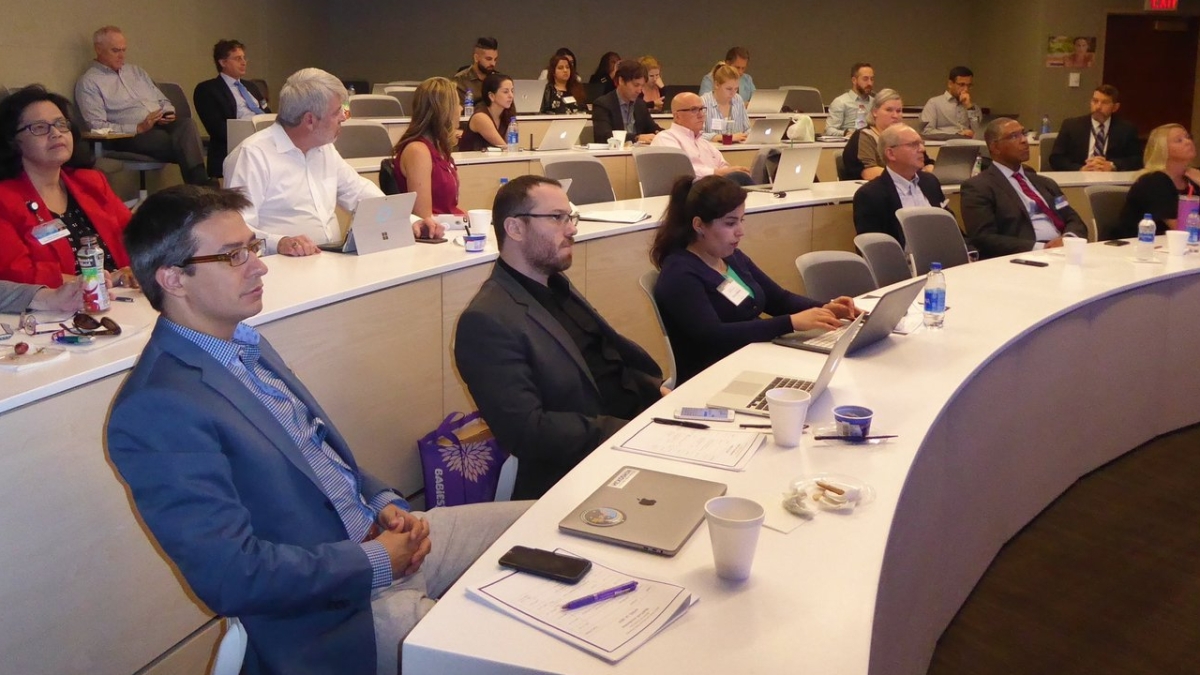Applications open for 2020 cohort of Mayo Clinic and ASU MedTech Accelerator

Participants in the inaugural 2019 Mayo Clinic and ASU MedTech Accelerator attend a lecture at Mayo Clinic Scottsdale Campus.
Mayo Clinic and Arizona State University are partnering for the second year to advance medical device and health care technology companies through the Mayo Clinic and ASU MedTech Accelerator. The program is seeking applicants ahead of its Jan. 30 deadline.
The MedTech Accelerator draws upon the combined strengths and resources of ASU Entrepreneurship and Innovation and Mayo Clinic to deliver an unparalleled experience for companies in the health care and medical device fields.
“ASU is pleased to partner with Mayo Clinic, a world-class innovator in health care, for this accelerator,” says Ji Mi Choi, associate vice president of ASU E+I. “In leveraging our collective strength, we have the opportunity to exponentially and positively impact the incredible improved health outcomes these entrepreneurs are seeking to drive.”
The accelerator is open to early-stage startups in the health care or medical device industry and growth- and late-stage startups looking at health care as an adjacent market. Companies must be based in the United States and have raised at least $500,000 in seed funding or be generating recurring revenue.
Promising applicants will be chosen to proceed into a cohort scheduled for March 23 to April 3. Selected companies will be required to execute a participation agreement and pay $50,000 to participate in the program. The fee can be paid as cash or convertible note.
The intensive, two-week cohort serves as an introduction period for companies, pairing them with customized resources from Mayo Clinic and ASU to specialize their products and services, license intellectual property, and sponsor research or clinical trials.
“Our goal is really to translate idealism into action and deliver the health care solutions of tomorrow, today,” said Dr. Steven Lester, a Mayo Clinic cardiologist who serves as the program’s chief medical officer.
Through Mayo Clinic, companies have access to physicians, clinical researchers and business development executives, while ASU offers resources from bioinformatics, engineering and business. Both institutions offer opportunities for licensing and access to potential investors.
“Participants are in a uniquely high-visibility position to find the right resources, meet the right people and accelerate their company’s futures,” said Rick Hall, senior director of health innovation at ASU's Edson College of Nursing and Health Innovation and the accelerator’s co-managing partner.
Companies will leave the cohort with personalized business plans and an immersive understanding of the health care ecosystem, and they will embark on a yearlong partnership with their distinctive set of connections.
Hall says the greatest value proposition for companies is access to Mayo Clinic and ASU subject-matter experts and the people leading health care innovation.
“Last year, one company returned to us after a meeting and said that meeting alone was worth the $50,000 they spent to get in,” said Hall, who heads the Health Entrepreneurship Accelerator Lab. “And that was the first day.”
Six companies participated in 2019 inaugural accelerator.
Ken Mayer, the founder and CEO of SAFE Health, called the first MedTech Accelerator “an amazing experience.”
“They really put together an amazing program that was tailored specifically to us,” he said. “It wasn’t this sort of abstracted program that they set up to be one size fits all.”
Lukas-Karim Merhi, founder and CEO of BioInteractive Technologies, noted the benefit of talking to experts, mentors and physicians with entrepreneurial experience.
“We’re very fortunate to have access to people like that who are invested in your success,” said Merhi.
The 2019 program was the first accelerator experience for Securisyn Medical, a Colorado-based medical device startup. Co-founder, COO and CFO Elyse Blazevich lauded the program for its unparalleled access to Mayo Clinic and ASU assets.
Some companies from last year’s program were even able to increase their initial investment many times over, though the MedTech Accelerator’s main purpose is to position companies to positively impact health care with the combined resources of Mayo Clinic and ASU.
“Ultimately we aim to make health care more convenient and accessible for people, and it’s through these partnerships that we're able to deliver those next-generation platforms and solutions for health care,” said Lester.
Learn more about the Mayo Clinic and ASU MedTech Accelerator and how to apply.
The MedTech Accelerator is supported by the Mayo Clinic and Arizona State University Alliance for Health Care. The alliance is developing comprehensive improvements in the science of health care delivery and practice, all toward one goal: continually advancing patient care. Together, the recognized world leader in patient care, education and research, and the nation's No. 1-ranked university for innovation are combining expertise from every corner of health care — doctors to bioengineers to business experts — for an adaptive approach to preparing the next generation of health care pioneers and practitioners in our communities.
More Health and medicine

ASU, University of Wisconsin partner to empower Black people to quit smoking
Arizona State University faculty at the College of Health Solutions are teaming up with the University of Wisconsin to…

New book highlights physician wellness, burnout solutions
Health care professionals dedicate their lives to helping others, but the personal toll of their work often remains hidden.A new…

80 years of pioneering speech and hearing services for the community
Over 80 years ago, in 1937, the first course in communication disorders, Speech Correction, was offered at Arizona State…